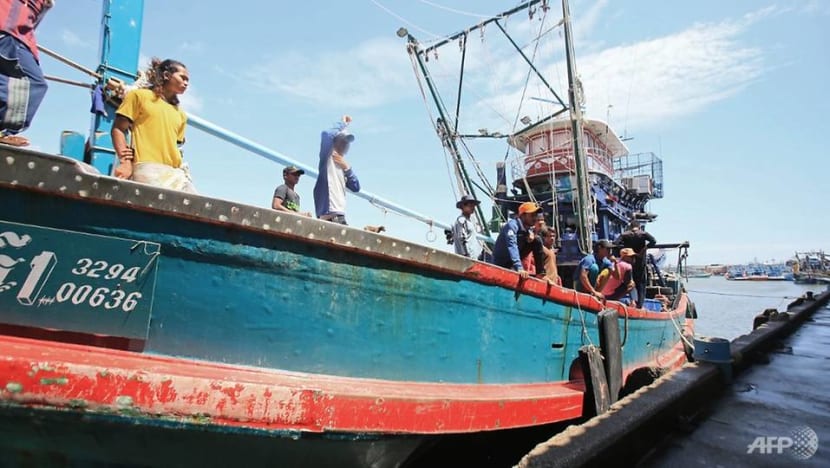Thailand’s seafood slavery: Why the abuse of fishermen just won’t go away
Despite the efforts of the government, exploitation in Thai fisheries still occurs owing to lax inspections, the withholding of wages and evasive reflagging of vessels, the programme Undercover Asia finds out.

Fishermen aboard a boat in Thailand's Pattani province in 2015. when the government began clamping down on illegal fishing. (Photo: AFP/Tuwaedaniya Meringing)
BANGKOK: Aung Ye Tun was just 17 years old when he was tricked and forced to work under slave-like conditions in a Thai fishing boat.
For five years, this Myanmar national was exploited along with other trafficked youths. “When the situation was at its worst, we used to say it was hell,” he said. “It was really like hell.”
He described how they worked round the clock with only half an hour’s rest a day, and anyone caught sleeping without permission would be beaten. Food was scarce, and some of them resorted to eating raw squid.
“If they saw us eating it, they’d beat us. So I’d hide the squid in my boot. Then I’d pretend to go to the toilet, and cook the squid in the exhaust pipe,” he recalled. “We were so angry and embittered.”
WATCH: 5 years as a slave on Thai fishing boats (5:04)
For decades, thousands of vulnerable migrants like him have suffered aboard Thai fishing boats, with no help and little means of escape.
READ: Thailand found failing to log fishermen's complaints of abuse and slavery
The Thai government has, under international and media scrutiny, began cracking down on this slavery at sea in recent years. But the perpetrators have found ways to navigate round the restrictions, as the programme Undercover Asia finds out. (Watch the episode here.)
GRABBING GLOBAL ATTENTION
Thailand is one of the world’s largest seafood exporters. Its products like sardines, prawn and squid had an export value of US$6 billion (S$8.4 billion) in 2018, according to research firm Statista.
The industry suffers from extreme labour shortages, however, which many boat owners try to resolve by trafficking in migrant workers from some of the poorer countries in the region.
Patima Tungpuchayakul, co-founder of Thailand-based non-governmental organisation Labour Protection Network (LPN), estimates that there are around 600,000 workers in this sector and around half of them are migrant workers.
Following a series of media exposés of the exploitation — from starvation to physical abuse — of these migrant workers in 2014 and 2015, the country’s fisheries began attracting the world’s attention.
In 2015, the European Commission threatened to ban Thailand’s seafood exports over the illegal and unregulated aspects of its fishing industry.
“That kind of negative attention created pressure on the (Thai) government and the industry to fix not just the illegal fishing problem but the labour problem too,” said Jason Judd, a former manager at the International Labour Organisation (ILO).
WATCH: The full episode — Slavery aboard Asia’s fishing vessels (47:30)
The government started improving protections for migrant workers by, for example, establishing port-in port-out (PIPO) inspections — which require boats to report for inspections as they depart and return to port — and increasing fines for violations.
Thailand also began working with the ILO, a United Nations agency, to improve labour laws, including to combat exploitation and trafficking.
“Among other things, the Thai government has applied labour law that applied ... on land to the sea. That’s a big deal,” said Judd.
DIFFERENT MEANS OF COERCION
While the new rules have changed the nature of the exploitation, they have not eradicated it.
Labour Minister Chatu Mongol Sonakul maintains that there is no human trafficking in the fishery sector, but a recent ILO report states otherwise.
Amid the improved working conditions due to changes in Thailand’s legal framework, abuses in the sector persist, according to the ILO.
“We ran through elements of forced labour, … and in the end, we determined that 14 per cent of fishers we surveyed were in forced labour situations,” said Judd.
In the past, threats of violence to keep migrant workers on the boats were common, but these days, boat owners coerce them by illegally withholding their wages instead.
“Fishers don’t have complete control over their pay. And that’s important because control over pay is control over work,” said Judd.
One of the changes in the past few years was the requirement that these workers have a bank account and are paid electronically. “But some vessel owners have taken control of fishers’ ATM cards,” he added.
Debt bondage exists in that some of these workers “are afraid to leave or change to another boat when they know they’re in debt”, said Ussama Kaewpradap, lead organiser at the Fishers’ Rights Network.
They continue working in the boats where they might get abused.”
She noted that some owners also hold on to the workers’ identification documents to prevent them from moving around or changing employers.
One migrant worker, who wanted to remain anonymous, said he was not allowed to keep his passport and documents on board the boat, where he stayed for over a year.
He was paid about 3,000 baht (S$135) when his boat returned to port. And when he asked for his salary, his employer told him to return to the boat.
“Then he called the police. One of the policemen … put me in handcuffs,” said the worker. “He then beat me up and left me in a monastery. And they didn’t give me my salary.”
Mongkol Sukcharoenkana, the president of the National Fishing Association of Thailand (NFAT), an alliance of fishery organisations and commercial operators, said the law is “quite harsh” to consider the confiscation of workers’ documents a “human-trafficking matter” and forced labour.
On the issue of bank cards, he said it could be that the workers do not know how to make withdrawals or that the ATMs are “too far away”.
“So they ask the captains to withdraw money for them, or they go with the captains to take money out. This is why they leave the cards with the captains,” he said.
‘A THEATRICAL EXERCISE’
As part of its initiatives to stop trafficking, Thailand has sent naval patrols to inspect fishing boats far from shore.
The government began using GPS trackers in 2015 to monitor vessels at sea, and inspecting fishing boats that dock at Thai ports to ensure compliance with the new rules.
During these inspections, the officials would check the workers’ contracts and ascertain if they were being looked after, said Chatu Mongol. Groups like the LPN, however, assert that these inspections are superficial and that labour abuses are rarely identified.
Human Rights Watch even called the labour inspections “largely a theatrical exercise for international consumption”.
“Under the PIPO system, … officials speak to ship captains and boat owners and check documents but rarely conduct interviews with migrant fishers,” the NGO said in 2018.
The NFAT claims, however, that trafficking of migrant workers has stopped as the new rules are too strict.
“If there’s an illegal worker on the boat, the punishment … is a fine of 400,000 to 800,000 baht, and the fishing licence would be confiscated. The punishments are quite severe,” said Mongkol.
To crack down harder on illegal migration, Thailand and Myanmar signed a memorandum of understanding to legally provide workers from Myanmar to Thai fisheries.
Under the MOU, the paperwork is processed by official agencies, which gives the semblance of a safety net for workers. But problems have been known to emerge after the contracts are signed.
U Moe Wai, who heads the Migrant Worker Education Centre in Kawthaung, a Myanmar border town, said the MOU is indirectly giving licence to human trafficking.
“Only 30 per cent of the workers are protected, and the other 70 per cent aren’t protected because agencies aren’t complying with the rules,” he said.
REELING IN LONG-HAUL FISHING
The Thai government has also placed restrictions on overseas fishing — Thai-flagged fishing boats must return to a Thai port within 30 days at sea. This effectively put an end to long-haul fishing, said Judd.
But these regulations are applicable only to fishing boats registered with the country. And when these Thai-flagged vessels venture into international waters, “it’s hard to police them”.
The captain of one transport vessel said there are “Thai boats with Myanmar names” fishing in the sea around Myanmar. And the operators usually “bribe the Navy or the authorities to (let them) continue working”.
“The big boats work for three months, without enough food supplies, and let the workers starve,” said the captain, who wished to remain anonymous.
Some people take their own lives by jumping into the water. … Sometimes the authorities don’t even know that someone died.”
Some Thai boats have been renamed and reflagged in Myanmar, where there is less scrutiny. Other boats are thought to be fishing near Africa, under flags of countries with almost no maritime regulations, like Mongolia.
“We don’t really have a good list of how many Thai ships have been sold abroad,” said Chatu Mongol.
But it is not illegal, he added, for Thai-registered vessels to be sold overseas and for workers to continue working on these boats. “There's no law saying that once you’re a Thai vessel, you’re always a Thai vessel.”
Years of inconsistent regulation have made it difficult to track vessels that have been traded. And when they are unregulated, it also means the migrant workers on board are more at risk.
FEW CARED ABOUT THEIR LIVES
Last October, citing Thailand’s “long-standing worker rights issues in the seafood and shipping industries”, the United States government moved to suspend US$1.3 billion in trade preferences for the country.
READ: Trump hits Thai seafood industry over worker rights
The reasons included the “failure to adequately provide internationally-recognised worker rights”, such as “protections for freedom of association and collective bargaining”.
Patima recalled that in the past, however, few people cared about the lives of these migrant workers.
“We only questioned whether the seafood we ate was fresh and cheap. But we never once asked if the lives of the fisherman were as good as ours,” she said.
The NGO she founded has rescued and rehabilitated about 5,000 former fishermen enslaved by boat owners in Southeast Asian waters.
Since the crackdown began, hundreds of migrants have returned to Myanmar. But life is tough for them.
“The majority — about 70 per cent of the deported — will work again on illegal fishing boats,” said Moe Wai. “That’s because fishing is the only skill they possess.”
As for Ye Tun, he got a job working in a makeshift gold mine, where he faces a risk of either a landslide or a wooden frame collapsing on top of him inside the mine shaft.
“But let me tell you honestly, I’ll work in the gold mine for the rest of my life if it means that I don’t have to go back to the ocean even for a year,” he said.
Watch this episode of Undercover Asia here.















